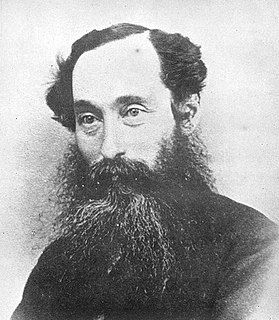
The prime minister of New Zealand is the head of government of New Zealand. The incumbent prime minister, Jacinda Ardern, leader of the New Zealand Labour Party, took office on 26 October 2017.

Sir Harry Albert Atkinson served as the tenth premier of New Zealand on four separate occasions in the late 19th century, and was Colonial Treasurer for a total of ten years. He was responsible for guiding the country during a time of economic depression, and was known as a cautious and prudent manager of government finances, though distrusted for some policies such as his 1882 National Insurance (welfare) scheme and leasehold land schemes. He also participated in the formation of voluntary military units to fight in the New Zealand Wars, and was noted for his strong belief in the need for seizure of Māori land.

Sir Edward William Stafford served as the third premier of New Zealand on three occasions in the mid 19th century. His total time in office is the longest of any leader without a political party. He is described as pragmatic, logical, and clear-sighted.

The 39th New Zealand Parliament was a term of the Parliament of New Zealand which began with the general election held on 25 November 1978, and finished with the general election held on 28 November 1981. The dates of the Muldoon Ministry were from 13 December 1978 to 11 December 1981.

The 40th New Zealand Parliament was a term of the Parliament of New Zealand. Its composition was determined by the 1981 election, and it sat until the 1984 election.

The 1911 New Zealand general election was held on Thursday, 7 and 14 December in the general electorates, and on Tuesday, 19 December in the Māori electorates to elect a total of 80 MPs to the 18th session of the New Zealand Parliament. A total number of 590,042 (83.5%) voters turned out to vote. In two seats there was only one candidate.

Felix Edward Wakefield was the son of Felix Wakefield, one of Edward Gibbon Wakefield’s younger brothers. Edward was born in Launceston, Tasmania, brought up in New Zealand, and educated in France and at King's College London.
The following lists events that happened during 1819 in New Zealand.

Alfred Saunders was a 19th-century New Zealand politician.
The third New Zealand Parliament was a term of the Parliament of New Zealand. Elections for this term were held between 12 December 1860 and 28 March 1861 in 43 electorates to elect 53 MPs. Two electorates were added to this during this term, Gold Fields District and a new Dunedin electorate created by splitting the existing City of Dunedin into Dunedin and Suburbs North and Dunedin and Suburbs South, increasing the number of MPs to 57. During the term of this Parliament, six Ministries were in power.
The 4th New Zealand Parliament was a term of the Parliament of New Zealand.
The Third Atkinson Ministry was a responsible government in New Zealand, sometimes referred to as part of the Continuous Ministry. It took office after the retirement of Frederick Whitaker and continued the personnel and policies of the Whitaker and Hall ministries.
The Weld Ministry was the seventh responsible government to be formed in New Zealand, and lasted a less than a year during the New Zealand Wars. It formed in November 1864 and lasted until October 1865. As the office of premier had yet to be formally established, Frederick Weld was never gazetted premier but did resign the position at the end of his tenure.
The First Stafford Ministry was the third responsible government to be formed in New Zealand, and the first to last more than a few weeks. It formed in June 1856, and lasted until July 1861. As the office of Premier had yet to be established, Edward Stafford served as head of the government, although initially Henry Sewell was the Minister who reported to the Governor.
The Stout–Vogel Ministry was the second responsible government to be formed in New Zealand. It formed in August 1884 and governed until October 1887. From the outset, Robert Stout served as Prime Minister as well as Attorney-General whilst Julius Vogel held the post of Minister of Finance. Initially, the ministry lasted only two weeks, with Harry Atkinson managing to pass a vote of no confidence against Stout. However, Atkinson failed to establish his own government, and was unable to supplant Stout and Vogel who remained in power for the next three years.
The Third Stafford Ministry was the tenth responsible government to be formed in New Zealand, and lasted for a month.
The First and Second Atkinson Ministries were responsible governments in a period sometimes known as the Continuous Ministry. Harry Atkinson formed a government on 1 September 1876, but as it included 9 salaried ministers rather than the legally mandated 8, the Ministry was forced to resign on 13 September and take office again without John Hall. This second Atkinson ministry survived a full year.
The Hall Ministry was a responsible government in New Zealand, sometimes referred to as part of the Continuous Ministry. It took office after defeating Sir George Grey's supporters in a confidence motion, and is usually regarded as a conservative Ministry, although Hall himself described his followers as "the independent Liberal party".
The Fourth Atkinson Ministry was a responsible government in New Zealand, which lasted less than a week. It formed on 28 August 1884 after the fall of the first attempt at a Stout-Vogel coalition and lasted until Robert Stout and Sir Julius Vogel took back their majority on 3 September.

Edmund Bohan is a New Zealand historian, biographer, novelist, singer, and author.

















